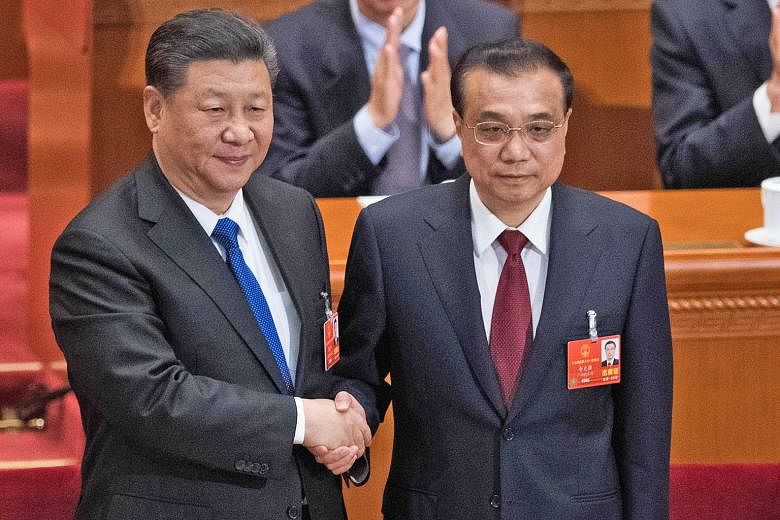Chinese Premier Li Keqiang has been appointed to a second five-year term during which he could be further marginalised.
This is as President Xi Jinping, who had already reduced Mr Li's role as economic planner, has put allies in positions that could chip away further at Mr Li's functions as premier, said analysts.
Mr Li, 62, was reappointed yesterday with 2,964 votes for and two against at the annual session of the National People's Congress (NPC) or parliament, a day after Mr Xi was given a second term unanimously.
Yesterday also saw the appointments of Central Miliary Commission members and the top judge, among others.
Mr Li was appointed the head of State Council or Cabinet as Premier in 2013, but was sidelined within the first two years by Mr Xi, said Hong Kong-based analyst Willy Lam.
The reasons were possibly that the two leaders had been rivals for the top job and did not see eye to eye on economic policy.
It has been the Premier's role to take charge of both the decision-making and enforcement of economic matters.
However, the decision-making role of the Premier has been weakened as Mr Xi has moved it to the Chinese Communist Party (CCP), noted Professor Zheng Yongnian, director of the East Asian Institute at the National University of Singapore.
Mr Xi also put himself in charge of the party's policy-making Leading Group for Financial and Economic Affairs, which is usually headed by the Premier, and made Mr Li his deputy.
Mr Xi also relied on his close ally Liu He, a Harvard-educated economist and vice-chairman of the National Development and Reform Commission, in economic policy.
Dr Lam noted that there was speculation in the third year of Mr Li's first term that he was tired of the situation and wanted to move to the NPC.
But during the CCP's national congress in October last year, Mr Li retained the No. 2 position in the party's top body, the Politburo Standing Committee, putting him on track to retain the premiership.
Removing him "would not be good for the solidarity of the party leadership and for the stability of the party and the country", said Prof Zheng.
Professor Steve Tsang of the School of Oriental and African Studies in London said: "The value of retaining Li lies in showing that Xi is leader not of the Xi faction but of the CCP and China as a whole."
However, Dr Lam said Mr Li could find himself further weakened as Premier in his second term.
Mr Liu is likely to be made Vice-Premier today and possibly the central bank governor, making him more powerful than before.
Mr Xi is also likely to involve his new Vice-President Wang Qishan in foreign policy and foreign relations matters.
This could erode the role of Mr Li in foreign relations - he now receives foreign guests, makes foreign bilateral visits and attends multilateral events like the East Asian summit.

